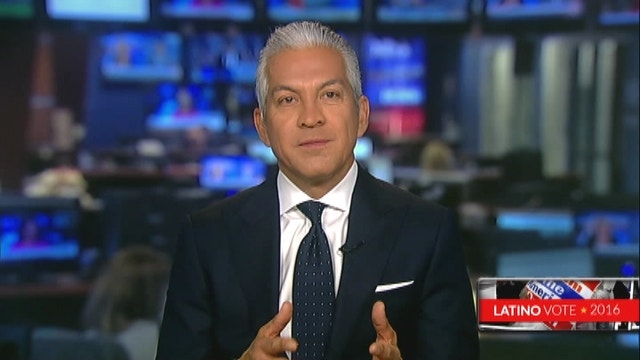Business leader on Trump plan to seize Mexico remittances
Donald Trump has revealed how he'll pressure Mexico to build what he calls a
In recent days, Republican presidential candidate Donald Trump provided details about how he would press Mexico to pay for the construction of what the mogul glowingly describes as a “great, great wall” along the U.S.-Mexico border.
The crown jewel of his plan, he said, was the seizure of the roughly billions of dollars that Mexicans in the United States send back home each year to help support their families.
A Trump presidency would crack down on these remittances until Mexico pays the estimated $5 billion to $10 billion the real estate mogul believes the construction of the wall would cost.
The president of the U.S. Hispanic Chamber of Commerce, Javier Palomarez, who is of Mexican descent and spent years working on helping to set up the remittance system, spoke to Fox News Latino about the pitfalls, as he sees it, of Trump’s plan.
“The infrastructure (of the remittance system) has created tens of thousands of American jobs,” Palomarez said, “it is a legitimate…legal system by where we facilitate the transfer of money, some $25 billion dollars from the U.S. into Mexico.”
And so, Palomarez argues, Trump’s ambitious, provocative plan would affect not just the Mexicans he seeks to unsettle, but the many American business and their employees who are part and parcel of the remittance industry.
“The proposed solution, first of all, is not a solution,” Palomarez said. “The proposed solution for paying for a wall could tax and burden that system, ultimately causing that system to collapse…causing American jobs.”
Critics say that remittances are crucial for many Mexicans back home struggling to make ends meet, and some entire towns are kept afloat through the financial help that comes from immigrants toiling back in the United States.
Cutting off that lifeline, many say, would end up driving many more Mexicans to take the hazardous trip across the U.S. border — putting into effect the law of unintended consequences.
“It is really an asinine solution that is great in terms of rhetoric, but there it no [substance] behind it,” Palomarez said.
The flow of illegal crossers along the border has stabilized, even declined somewhat, as the Mexican economy saw something of a bounce and immigration laws here grew stricter.
In a joint study by the U.S. Hispanic Chamber of Commerce and the George W. Bush Institute in Texas, conclusions showed a net migration of zero between the two countries, Palomarez said.
“This notion that we’re being overrun by immigrants taking jobs and taking over our economy is absolutely crazy,” he said.
“Are there people coming to this country?” he asked. “Absolutely. But it’s important to remember that as many people are leaving this country and going into Mexico.”
Does Mexico have a responsibility to do its part to stem the large number of illegal crossings into the United States?
“Mexico does play a part. It’s an important national security ally to the United States and has been for some time,” Palomarez said.
It’s crucial, he said, to find a border solution while also balancing the need to keep relations positive with an important neighbor.
“We look at the economic relationship between Mexico….Mexico is the third largest trading partner to America…$452 billion dollars of bilateral trade.”
“So this is an important relationship that we should be careful to guard and not offend,” he said.
Donald Trump and Javier Palomarez had a highly publicized falling out last year after the mogul committed to take part in a question-and-answer session the chamber has been hosting with presidential candidates from both parties.
But in an about-face, Trump bailed out, saying some pointed things about the chamber.
Palomarez, who was visibly perturbed over the sudden decision to skip the event, declared that Trump’s campaign – and chances for Latino support – were doomed by his action.
Since then, Palomarez told Fox News Latino, he has been in contact with the Trump campaign in the hope of getting the candidate to take part in a question-and-answer session.
Trump is the only one of the remaining presidential candidates of both parties who has failed to take part in the session.
If Trump becomes president, Palomarez said, “he will have to deal with the notion that we are a nation of immigrants.”
“The words, the solutions, the behavior [Trump has exhibited] seem to point to someone who doesn’t take immigrants, doesn’t take Mexicans, doesn’t take Hispanics every seriously, at best, and conceivably believes that in some fashion they are lesser beings.”











































